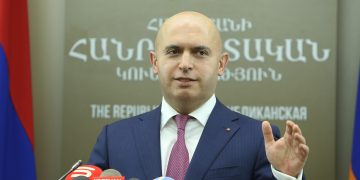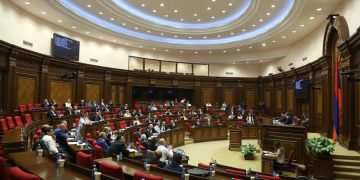In relation to the upcoming parliamentary elections in Armenia, the participating political parties and blocs have already started presenting their election programs in order to introduce their vision of the future economic development in Armenia.
Recently, “Tsarukyan” bloc has also introduced its program composed of 15 priority steps. When you read the program, you get the impression that the bloc has managed to find the “magic stick” that the Armenian Prime Ministers have not been able to find.
However, a slightly more careful examination of the program shows that it is flawed and unrealizable.
What They Promise
Thus, among a number of recommendations, the program envisages to establish a minimum wage of 80 thousand AMD in Armenia, raise the pensions by 25 thousand AMD, as well as exempt small and medium enterprises from taxes.
Unrealistic
A number of proposals in this program directly contradict the state regulation principles of economy. One of the pillars of the program is raising the minimum salary to 80 thousand AMD, which may seem a positive change. Nevertheless, you do not have to be a macroeconomist in order to understand that such sharp rise will be followed by mass cuts, including in the public sector.
The other group of proposals which envisages to give a three-year tax exemption to small and medium enterprises, as well as give a tax amnesty from fines and penalties is a direct contradiction to the logic of creating a fair and competitive environment. You do not have to be a genius to understand that the large companies will use different methods, including division into smaller economic units, to make use of the aforementioned preferences. And it is not difficult to guess what kind of impact it will have on the state budget.
In parallel, it is clear that implementation of the aforementioned steps will require enormous financial resources. In particular, it has been estimated that around 500 billion AMD will be required for the implementation of the proposed steps. For comparison, note that the state budget for 2017 envisages to provide 1.2 billion AMD in revenues, which means that more than 40 percent of the state budget revenues will be required for the realization of the aforementioned election program.
It is also evident that it is impossible to ensure such an increase in budget revenues in the short term. Hence, the program will inevitably lead to budget deficit and continuous rise of the national debt. Ultimately, the obligation of paying back the debt and the interest rates lies on the very same citizens. Therefore, we come to the paradox of the Greek model of development when a question arises as to how beneficial those changes are for ordinary citizens in the long term.
In sum, even the most superficial analysis of “Tsarukyan” bloc’s election program reveals the unfeasible and unrealizable nature of the proposed steps.

 FACTOMETER
FACTOMETER









